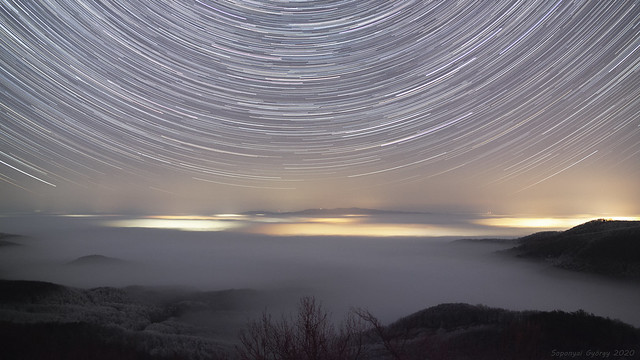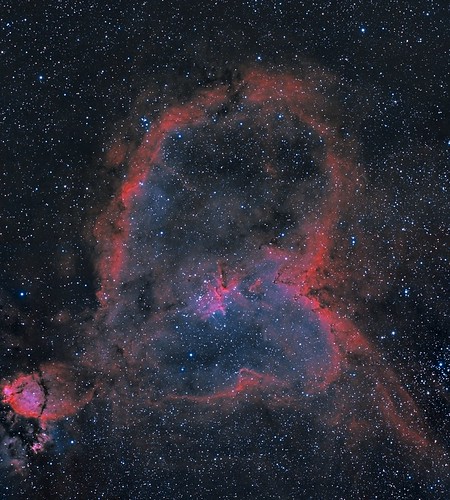Page 6 of 6
Comet C/2017 T2
Posted: Tue Jan 28, 2020 4:54 am
by Efrain Morales
Comet C/2017 T2 (Top-Left) approaching close to the double star cluster on January 27th, 00:47ut. The Double Cluster, or Caldwell 14, is the name for two open clusters – NGC 869 and NGC 884 – located close together in Perseus constellation.
Re: Submissions: 2020 January
Posted: Tue Jan 28, 2020 10:29 pm
by barretosmed
The Central Region of the Milky Way
BEST DETAILS:
https://www.astrobin.com/full/39vl74/D/?nc=user
EQUIPMENT:
CANON 6D MODIFIED
Rokinon 14mm F2.4
29 X 180 "
100 BIAS
15 DARKS
LOCATION: MUNHOZ - MG - Brazil
DATE: JULY 06, 2019
Processing and capture:
Software: PIxinsigh, Adobe Photoshop,
Polar alignment with: Polemaster and SharpCap'
Copyright: Fernando Oliveira de Menezes
Email:
Barretosmed@hotmail.com
Re: Submissions: 2020 January
Posted: Wed Jan 29, 2020 12:57 pm
by vanamonde81
Dobogó-kő Startrails
Copyright: György Soponyai
Dobogó-kő is the highest peak of the Visegrád Mountains
(700 meter) in Hungary. The peak has a wonderful outlook towards Northern direction with the Danube Bend as it flows between Börzsöny and Visegrád Mountains. Hungary has a terrible astro climate: the country
(and mainly the amateur astronomers living here) "suffer" every Fall and Winter from dense fog that stales for weeks blocking all lights from the skies.
27th January 2020 was yet another foggy day so I decided to travel to Dobogókő
(the nearby village -- without hyphen) that was above of the cloud layer according to online webcams. I initially planned to capture the setting crescent Moon but by seeing the wonderful, crystal-clear skies I quickly changed my mind and created this "
Standing at the Seaside of Clouds"-style startrail photo.
 2020.01.27. Dobogókő, Hungary
2020.01.27. Dobogókő, Hungary
Canon EOS 5D Mark II + Samyang EF 24/1.4
69 x 60 sec, F 2.8, ISO 2500
Re: Submissions: 2020 January
Posted: Thu Jan 30, 2020 7:22 pm
by Michael Deger
vdB 9 + LDN 1357
Copyright Michael Deger
Image details and higher resolution:
http://galaxyphoto.de/en/vdb009/
Kind regards
Michael Deger
Re: Submissions: 2020 January
Posted: Fri Jan 31, 2020 1:25 am
by barretosmed
The rose of space: I present the rosette nebula
The petals of this cosmic rose are actually a nursery of stars.
What characterizes this image is the sculpture drawn by the globules of dark dust.
The stars emit ultraviolet radiation that ionizes the surrounding hydrogen cloud, which gives the image a red color.
More details:
https://www.astrobin.com/full/lwk0mm/B/?nc=user
EQUIPMENT:
APO TS 80MM
15 X 200 BIN2 G
15 X 200 BIN2 B
20 X 200 BIN2 R
23 X 300 BIN1 L
LOCATION: JALES - SP
DATES: DECEMBER 23 - 27, 2019
Processing and capture:
Software: @PIxinsigh, Adobe Photoshop, APT, PHD, Polemaster, SharpCap
Copyright: Fernando Oliveira de Menezes
Email:
Barretosmed@hotmail.com
Re: Submissions: 2020 January
Posted: Fri Jan 31, 2020 5:00 am
by Sleepless
Re: Submissions: 2020 January
Posted: Fri Jan 31, 2020 2:34 pm
by IO_12
Comet C/2017 T2 (PanSTARRS) near the double cluster in Perseus
Proper motion between Jan 20th and Jan 30th 2020
Copyright: Velimir Popov, Emil Ivanov @
Irida Observatory
More info and hi-res images on
website
Re: Submissions: 2020 January
Posted: Fri Jan 31, 2020 8:05 pm
by KuriousGeorge
Continuing my quest for difficult and rarely imaged distant objects, I came across this image of NGC 5216/5218 by Adam Block...
https://www.adamblockphotos.com/ngc-5216.html
This is LRBG = 10:4:4:4 hours in his 32-inch Schulman RCOS.
Unfortunately the wind and sky this month didn't permit 20+ hours in the Planewave 24". But fortunately I had one long night with exceptional seeing, down to 1.5" FWHM measured on 15-minute subs. (-:
I'm pleased with the overall results and the additional galaxy (NGC5205 @ 103.5 MLY!) that happpened to be in frame.
From Adam's APOD...
"Galaxies NGC 5216 (left) and NGC 5218 really do look like they are connected by a string. Of course, that string is a cosmic trail of gas, dust, and stars about 22,000 light-years long. Also known as Keenan's system (for its discoverer) and Arp 104, the interacting galaxy pair is some 17 million light-years away in the constellation Ursa Major. The debris trail that joins them, along with NGC 5218's comma-shaped extension and the distorted arms of NGC 5216, are a consequence of mutual gravitational tides. The tides disrupt the galaxies as they repeatedly swing close to one another. Drawn out over billions of years, the encounters will likely result in their merger into a single galaxy of stars. Such spectacular galactic mergers are now understood to be a normal part of the evolution of galaxies, including our own Milky Way."
https://www.astrobin.com/28qbfc/



